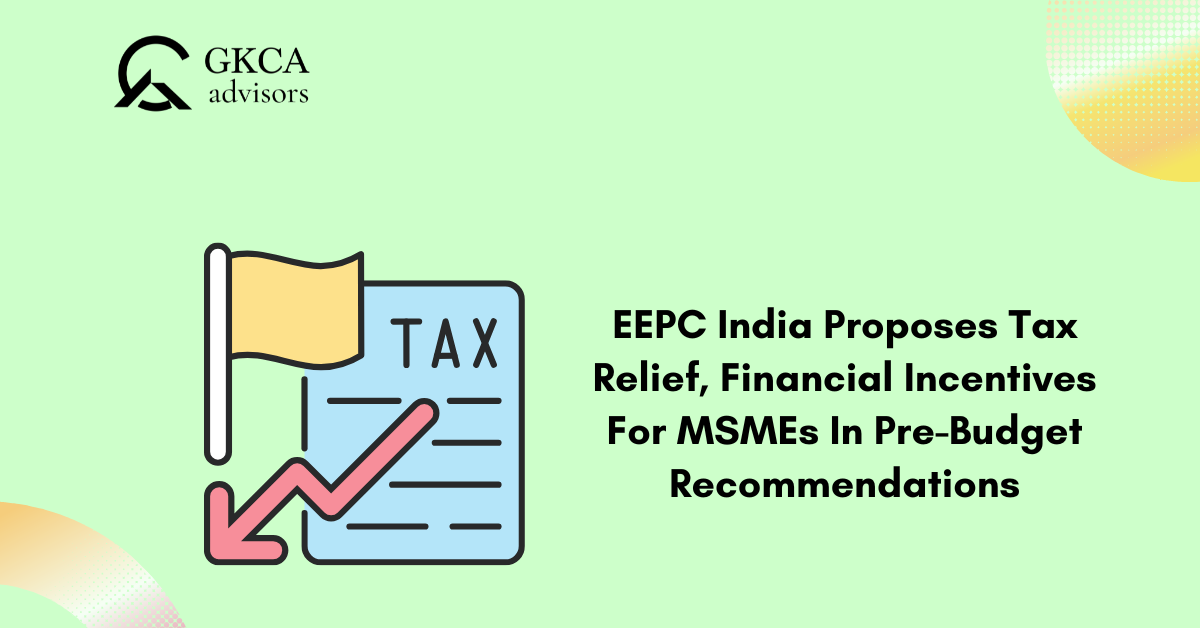In the dynamic landscape of India’s economic ecosystem, Micro, Small, and Medium Enterprises (MSMEs) stand as the backbone of economic growth and innovation, as echoed by EEPC India also suggested increasing support for these units. As the 2024 Union Budget approaches, stakeholders are eagerly anticipating strategic financial incentives that could potentially transform the MSME sector. This comprehensive analysis explores the critical pre-budget recommendations, potential tax reliefs, and strategic support mechanisms that could propel MSMEs towards unprecedented growth and resilience.

Understanding why this article matters is crucial. MSMEs contribute significantly to India’s GDP, employment generation, and export potential. With targeted financial incentives, these enterprises can overcome existing challenges, boost competitiveness, and play an even more pivotal role in India’s economic narrative. Whether you’re an MSME owner, policymaker, investor, or economic enthusiast, this deep dive into pre-budget recommendations offers invaluable insights into the potential game-changing strategies for small businesses.
Table of Contents
- Understanding MSME Landscape in India
- EEPC India’s Pre-Budget Memorandum: Key Highlights
- Financial Incentives: What MSMEs Are Seeking
- Tax Relief Proposals: A Game-Changing Approach
- Interest Equalisation Scheme: Boosting Working Capital
- Solar Power Generation: New Frontier for MSME Investment in the context of the unionbudget2025.
- Challenges Faced by MSME units in Current Economic Scenario.
- Strategic Recommendations for Budget 2024
- Global Competitiveness and Export Potential
- Future Outlook: Transforming MSME Ecosystem
Understanding MSME Landscape in India
The MSME sector in India represents a vibrant and critical component of the national economy. Contributing approximately 2-10 times more employment compared to large industries, these enterprises are the true engines of economic dynamism. From sole proprietorships to private limited companies, MSMEs span diverse business structures and sectors, each playing a unique role in India’s economic fabric.
Recent studies highlight the sector’s significance, especially in the context of financial incentives for MSMEs, as emphasized by the apex engineering exports promotion body. Nearly 60 per cent of India’s GDP is attributed to MSMEs, underscoring their importance beyond mere numerical representation. These enterprises are not just economic units but catalysts of innovation, regional development, and sustainable growth.
EEPC India’s Pre-Budget Memorandum: Key Highlights
The Engineering Export Promotion Council (EEPC India) has been at the forefront of advocating for MSME interests. In their pre-budget memorandum to the ministry, they have outlined comprehensive recommendations aimed at providing strategic support and financial relief to MSME units.
EEPC India’s recommendations are meticulously crafted, addressing multiple dimensions of MSME growth. From tax proposals to financial incentives, their memorandum represents a holistic approach to empowering the MSME segment. The council’s insights draw from extensive ground-level research and interactions with MSME stakeholders, including inputs from the ministry of micro.
Financial Incentives: What MSMEs Are Seeking
Financial incentives for MSMEs remain a critical aspect of their growth. The sector is seeking multiple forms of support, with a particular focus on accessible credit, reduced tax burdens, and investment-friendly policies. Key areas of interest include interest equalisation schemes, enhanced credit limits, and simplified financial regulations.
The proposed changes range from increasing credit limits from Rs 50 lakh to Rs 10 crores to providing more flexible financing options. These incentives are not merely monetary interventions but strategic tools designed to enhance the competitiveness and sustainability of MSME units.
Tax Relief Proposals: A Game-Changing Approach
Taxation has long been a significant concern for the MSME segment, necessitating reforms in the upcoming unionbudget2025. The current proposals suggest transformative changes in the income tax landscape. Private limited companies currently pay 25 per cent tax, while entities like sole proprietorships and partnerships face higher tax rates of approximately 35 per cent, highlighting the need for a taxproposal to support MSME units.
The proposed tax relief includes reducing the income tax slab for MSME manufacturing units and introducing more favorable tax conditions. A potential 25 per cent income tax slab could provide substantial financial breathing room for small businesses, enabling them to reinvest and expand.
Interest Equalisation Scheme: Boosting Working Capital
The Interest Equalisation Scheme (IES) emerges as a critical financial mechanism for MSMEs. By providing reduced interest rates on loans, this scheme aims to enhance the working capital accessibility for small enterprises, aligning with the financial incentives for MSMEs. EEPC India said it has suggested increasing the benefits limit available under the scheme to support MSMEs.
Current proposals recommend expanding the scheme’s coverage, potentially increasing the limit from Rs 50 lakh to Rs 10 crores. This expansion could significantly improve MSMEs’ financial flexibility, enabling them to invest in technology, infrastructure, and human resources.
Solar Power Generation: New Frontier for MSME Investment
An innovative recommendation focuses on solar power generation as a strategic investment avenue for MSMEs. The proposals include offering 100 per cent depreciation for investments in solar power generation, presenting a dual benefit of environmental sustainability and financial incentives.
This forward-looking approach encourages MSMEs to explore renewable energy investments. By providing substantial tax benefits, the government aims to stimulate green technology adoption while supporting small businesses in diversifying their investment portfolios.
Challenges Faced by MSMEs in Current Economic Scenario
Despite their resilience, MSMEs continue to navigate complex economic challenges. Limited access to credit, regulatory complexities, technological gaps, and global market uncertainties pose significant hurdles for MSMEs, as discussed in the Economic Times. The pre-budget recommendations aim to address these multifaceted challenges through targeted interventions, particularly focusing on incentives for MSMEs in pre-budget discussions.
Factors like limited R&D investments, technology adoption barriers, and competitive pressures demand comprehensive support mechanisms. The proposed incentives are designed not just as financial relief but as strategic tools for holistic enterprise development.
Strategic Recommendations for Budget 2024
The pre-budget discourse emphasizes several strategic recommendations. These include simplifying tax structures, enhancing credit accessibility, promoting innovation, and providing targeted sector-specific support for MSME units. The goal is to create an ecosystem that nurtures and accelerates MSME growth.
Key recommendations include reducing compliance burdens, offering tax incentives for reinvestment, supporting digital transformation, and creating specialized funding mechanisms. These proposals reflect a nuanced understanding of the diverse challenges faced by small businesses.
Global Competitiveness and Export Potential
Export potential remains a critical focus area for MSMEs. The recommendations aim to enhance the sector’s global competitiveness through financial support, simplified export procedures, and targeted promotional strategies, as noted by KNN India. EEPC India has been particularly vocal about improving the export ecosystem.
By providing financial incentives, reducing regulatory complexities, and offering strategic support, the proposed measures seek to position Indian MSMEs as robust players in the global marketplace.
Future Outlook: Transforming MSME Ecosystem
The proposed pre-budget recommendations represent more than financial interventions – they signify a comprehensive vision for transforming India’s MSME ecosystem. By addressing financial, technological, and regulatory challenges, these strategies aim to unlock the sector’s full potential.
The future looks promising, with increased focus on innovation, sustainability, and strategic growth. The MSME sector stands at the cusp of a significant transformation, poised to play an even more crucial role in India’s economic narrative.
Key Takeaways: MSME in Pre-Budget recommendations Insights
- MSMEs contribute nearly 60 per cent to India’s GDP
- Proposed tax relief includes potential 25 per cent income tax slab
- Interest Equalisation Scheme might expand credit limits to Rs 10 crores
- 100 per cent depreciation offered for solar power generation investments is a significant incentive for MSMEs in pre-budget discussions.
- Strategic recommendations focus on holistic enterprise development
- Export potential and global competitiveness are key focus areas for MSMEs, especially highlighted in recent news network reports.
- Technological innovation and digital transformation are critical for MSMEs in pre-budget recommendations.
- Simplified tax structures and reduced compliance burdens are proposed in the prebudget discussions.
- Financial incentives aim to boost working capital and reinvestment
- Renewable energy investments are being actively encouraged as part of the financial incentives for MSMEs.
The journey towards a robust and dynamic MSME ecosystem continues, with each budget presenting new opportunities for growth, innovation, and strategic transformation.
